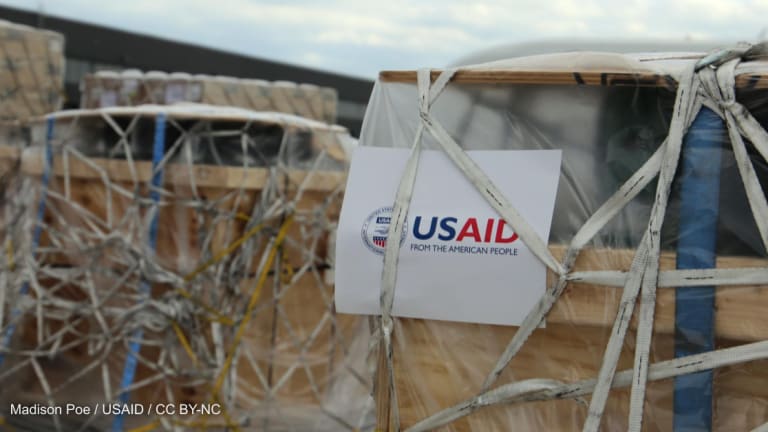Rajiv Shah unveils new USAID evaluation policy, previews other contracting reforms
USAID chief Rajiv Shah has unveiled new procurement reform initiatives – some of them effective immediately – that are meant to boost the monitoring and evaluation of field projects and more closely scrutinize especially the government’s larger implementing partners.
U.S. Agency for International Development Administrator Rajiv Shah on Thursday (Jan. 19) unveiled several new procurement reform initiatives — some of them effective immediately — that are meant to boost the monitoring and evaluation of field projects and more closely scrutinize especially the government’s larger implementing partners. The move is part of the Obama administration’s ongoing quest to win public and congressional support for turning USAID, an agency that has been widely criticized for being overstretched and underfunded, into an innovative enterprise that leverages more investment from partner countries and the private sector than it relies on outside contractors and consultants. “That’s why our reforms are not trying to build an updated version of a traditional aid agency,” Shah proclaimed in a speech hosted by the Center for Global Development in Washington. “We are seeking to build something greater: a modern development enterprise.” A new evaluation policy now requires a performance evaluation conducted by independent third parties, not by the implementing partners themselves, for every major USAID project. To better evaluate the impact of field projects, USAID plans to not just report results, but to collect baseline data and employ study designs that explain what would have happened without U.S. intervention. The agency plans to release all evaluations within three month of completion, and integrate some data into its new Foreign Assistance Dashboard. USAID is also continuing efforts to synchronize contracting and grant-making procedures. As part of the new push to boost evaluation, for instance, reporting requirements may change for some contractors and grant recipients, one USAID source said, adding that the agency did not expect its partners to pay for additional evaluation staff out of their operating expenses. All grant and contract extensions in excess of $5 million that are being awarded without a competitive process will – starting this week – require personal approval by the USAID administrator. Shah blasts over-reliance on contractors Shah did not hold back when describing the problems these reforms were meant to address. “Our industry is full of incentives designed to prolong our efforts, rather than reduce them. As a result, handoffs rarely happen; projects are extended in perpetuity while goals remain just out of reach. There is always another high-priced consultant that must take another flight to attend another conference or lead another training,” said Shah, adding to applause: “I say today to all funders and practitioners of development: These days must end.” USAID was “no longer satisfied with writing big checks to big contractors and calling it development,” Shah said. “Partners need to achieve the outcomes they seek in the time they suggest. Otherwise, we will seek out those who can.” The agency is also stepping up efforts to prevent fraud, waste and abuse with a new suspension and debarment task force led by Deputy Administrator Don Steinberg, which at the end of last year suspended one of its largest contractors, AED, pending an investigation into the consultancy’s work in Afghanistan and Pakistan. READ: AED Barred From Receiving New USAID Funding Pending Investigation into Consultancy’s Af-Pak Work Shah stressed: “We will hold all our implementing partners to strict account, regardless of their size. Too big to fail does not exist in our world.” Shah’s message to Congress, which holds the U.S. government’s purse strings and appears to have limited appetite for comprehensive U.S. aid reform or funding increases this year: A robust foreign affairs budget and rejuvenated aid operation will increase national security and boost the economy. Other news from Shah’s speech: • USAID is continuing its release of “comprehensive strategies” for key areas such as education, water and climate, to outline how to achieve development gains faster, more sustainably and at lower cost. • USAID will unveil its first-ever policy on the role of development assistance in countering violent extremism and insurgency “next month,” building on tools like the District Stabilization Framework and built-in close collaboration with the Pentagon. • USAID has joined the International Initiative for Impact Evaluations. • As part of its Development Leadership Initiative, USAID is hiring more mid-career technical professionals “capable of managing complex contracts”;USAID is closing a “staffing gap” in Africa. • USAID’s recently launched budget office has already identified “hundreds of millions of dollars in savings.” • By 2015, USAID expects to end assistance to at least seven countries, starting with Montenegro in 2012. David Beckmann, co-chair of the Modernizing Foreign Assistance Network, called Shah’s speech “extraordinary and hard-hitting” and ongoing USAID reforms “essential and timely,” urging the Obama administration to work with policymakers from both parties to draft legislation that will “enshrine this new development business model in law in order to drive long-term results.” Oxfam America praised Shah for leading a “renaissance” at USAID that “puts poor people in the driver’s seat.” But, in a reaction that foreshadows tough choices ahead, Oxfam America Director of Aid Effectiveness Gregory Adams also noted: “For too long USAID has been understaffed. Building up USAID’s internal capacity is critical to its long-term development success. This will require reshaping USAID’s global footprint, closing some missions and offices and expanding staffing in others, while continuing US leadership and participation in key international forums.” Read more on U.S. aid reform online, and subscribe to The Development Newswire to receive top international development headlines from the world’s leading donors, news sources and opinion leaders — emailed to you FREE every business day.
U.S. Agency for International Development Administrator Rajiv Shah on Thursday (Jan. 19) unveiled several new procurement reform initiatives — some of them effective immediately — that are meant to boost the monitoring and evaluation of field projects and more closely scrutinize especially the government’s larger implementing partners.
The move is part of the Obama administration’s ongoing quest to win public and congressional support for turning USAID, an agency that has been widely criticized for being overstretched and underfunded, into an innovative enterprise that leverages more investment from partner countries and the private sector than it relies on outside contractors and consultants.
“That’s why our reforms are not trying to build an updated version of a traditional aid agency,” Shah proclaimed in a speech hosted by the Center for Global Development in Washington. “We are seeking to build something greater: a modern development enterprise.”
This story is forDevex Promembers
Unlock this story now with a 15-day free trial of Devex Pro.
With a Devex Pro subscription you'll get access to deeper analysis and exclusive insights from our reporters and analysts.
Start my free trialRequest a group subscription Printing articles to share with others is a breach of our terms and conditions and copyright policy. Please use the sharing options on the left side of the article. Devex Pro members may share up to 10 articles per month using the Pro share tool ( ).
Rolf Rosenkranz has worked as a Global Editor for Devex. Previously, Rolf was managing editor at Inside Health Policy, a subscription-based news service in Washington. He has reported from Africa for the Johannesburg-based Star and its publisher, Independent News & Media, as well as the Westdeutsche Allgemeine Zeitung, a German daily.




